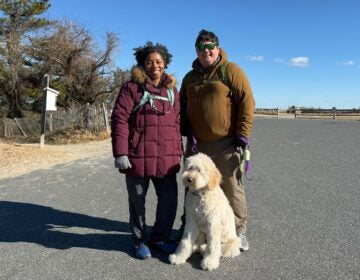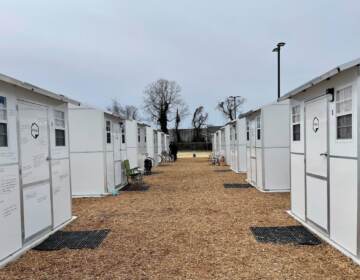Giving 40 expecting moms ‘a hand up,’ Delaware pilot program provides $1,000 a month for bills, formula, diapers
Victoria Rodriguez said she’s “not sure how we would have done it’’ without the guaranteed basic income stipend. But will the state continue the program?

Victoria Rodriguez, with her son Silas in May. Rodriguez is receiving $1,000 a month to help make ends meet. (Courtesy of Victoria Rodriguez)
From Philly and the Pa. suburbs to South Jersey and Delaware, what would you like WHYY News to cover? Let us know!
When Victoria Rodriguez became pregnant in 2021, the 29-year-old student and dental billing specialist knew money would be tight.
While Rodriguez and her boyfriend, who works at an Amazon warehouse, began planning for the baby, they learned about a state-sponsored initiative that could help them surmount financial hurdles.
The pilot program is giving $1,000 a month for two years to 40 low-income mothers who live in a few selected Wilmington and New Castle area ZIP codes. To qualify, they had to be in the first or second trimester of pregnancy and agree to quarterly evaluation sessions.
Rodriguez was accepted, and said “the timing was just a little bit divine, honestly.”
She says the monthly debit card and associated state services she accessed has made a huge difference for her family and their baby, 14-month-old Silas.
“It helped immensely because at the time I was struggling just to keep afloat with my job,’’ said Rodriguez, who continued working at the dental office until just before Silas was born.
She said the money went to various bills: car payment, rent, cell phone, lots of food, and once the baby was born in July 2022, lots and lots of infant formula, which costs about $50 for a 30-day supply.
“Formula is very expensive, along with diapers,’’ Rodriguez said. “Without it, it would have been really, really tough. I’m not sure how we would have done it.”
Rodriguez, who has continued her education, will get her $1,000 monthly card for a few more months, and then plans to return to the workforce. And that’s the aim of Delaware’s experiment with a Guaranteed Basic Income program, which is being used in dozens of localities across the country, including Philadelphia.
Delaware’s program is different in that the money is just going to those who are pregnant with low-income in targeted ZIP codes. The state’s program is being funded with a combination of federal pandemic relief dollars and staff from the state Division of Public Health.
The initiative is being overseen by the Delaware Healthy Mother and Infant Consortium, whose mission is to reduce infant and maternal mortality and improve the health of new moms and babies.
Delaware’s infant mortality rate was one of the highest in the nation two decades ago, but efforts to reduce it have paid off, according to the U.S. Centers for Disease Control and Prevention.
In 2005, Delaware infant mortality was the nation’s fifth highest, with 9.02 deaths per 1,000 live births. In 2021, the last year for which CDC data is available, Delaware’s rate had fallen to 4.77, and ranked 35th of the 50 states.
‘It’s going to require a replenishment of funds’
Beyond agreeing to participate in program evaluations every three months, the new moms were also offered wraparound services, such as case management, financial coaching, assistance with securing affordable housing, and help keeping their jobs or getting one.
Rodriguez said she benefited from financial coaching and was even able to get postpartum therapy to aid her in the early stages of motherhood.
The program also helped several women apply for and obtain other government benefits such as SNAP, formerly known as food stamps, and the Women, Infants, and Children (WIC) program that provides money for formula and other foods for mothers during pregnancy and for children up to age 5.
Dr. Priscilla Mpasi, a pediatrician who chairs the consortium, says the program has been a rousing success for the moms and babies while injecting money into the economies of low-income neighborhoods. She said fewer mothers reported going to the emergency room or staying in the hospital than in the year before they began receiving the monthly payment and using other services.
“So that’s decreasing costs on one end,’’ Mpasi said. “From a public health standpoint, we now have mothers that have gone through the program that have developed financial literacy, that have received stable housing, that have food access, and that’s a win on the public health side.”

Mpasi isn’t content with the program only being a pilot. “So the next step is scaling it,’’ she said. “It was only 40 women. How do we now get to 400? How do we scale up even more than that? It’s going to require a replenishment of funds.”
That, however, would take a commitment by the state government and lawmakers to commit millions of dollars to a Guaranteed Basic Income program, or securing federal or philanthropic dollars to pay the stipend. The two-year pilot cost $480,000, but providing the same stipend to 400 pregnant women would cost $4.8 million over two years, plus support services.
Leah Woodall, section chief for the Family Health Systems unit of the Division of Public Health, said the pilot program has achieved “good strong results” on both the health and financial fronts, and hopes policymakers and lawmakers take notice.
She said almost all of the women accessed prenatal care while receiving the $1,000 monthly stipend and only a handful of the 40 babies had any birth complications.
“That’s amazing,’’ Woodall said. “Certainly we saw strong health outcomes based on those two data points. So I’m really happy to see that.”

‘Maybe there’s a better way to accomplish these goals’
State Sen. Bryant Richardson, a Republican who represents the Seaford area of southwestern Delaware and sits on the consortium, said he supports helping low-income pregnant women, particularly as an alternative to abortion.
“I understand there are some people that do face some dire situations, that they don’t have the the revenue they need to to be able to take care of themselves adequately,’’ Richardson said. “I”m certainly in favor of anything that will encourage pregnant women to give birth and if this is what it takes for those who are below the poverty level, then I don’t want to discourage that.”

But Richardson said he isn’t ready to support an expansion, and questions an assertion by the consortium that the program has achieved a 324% return on investment. That calculation is based on estimates of the additional government benefits, salaries from their jobs, housing that has been secured, reductions in medical costs, and a so-called “multiplier effect” on how the money moves through the economy.
Richardson said he doesn’t think the financial impact numbers “add up” and he plans to raise the issue at the next consortium meeting.
“The only thing I want to do is make sure the numbers work and maybe there’s a better way to accomplish the same goals,’’ Richardson said. “I certainly think there is potential to do some good through this program. I just want to dig a little deeper.”
Woodall said she supports the calculations. “Hopefully our partners will advocate for sustainability and I think that the results will speak for themselves,’’ she said.
Josette Manning, who as secretary of the Department of Health and Social Services oversees public health, said her office is evaluating the results while pondering whether to pursue its continuation.
“I think that it is a great pilot,’’ Manning said. “It is putting resources directly into the hands of people who need them. Whether or not it can or should be expanded is going to depend on the data analysis of the return on investment.”
Manning noted that the data is only from a “small population” of 40 recipients.
“Obviously when you have such limited data, you need to really take time and consider it and that’s why we will continue to review it and we have not made any decisions about expansion,” Manning said.
‘Beautiful way to help mothers grow out of their situation’
Dr. Mpasi said expansion is the best way to support pregnant mothers with financial needs.
“We know the old adage, ‘It takes a village to raise a child,’ and it’s important to ensure that that village is supported and sustainable,’’ Mpasi said.
“That support takes some financial resources. You need to make sure that there’s housing, that there’s food access, that there is transportation, that there’s clothing — the basic needs for the child to really thrive in the village.”
Mpasi also says the money isn’t a handout.
“It’s a hand up. We’re pulling people up to try to get them to the same level where they have the same opportunity for success,” she said. “So our participants are using these funding sources to establish the basic needs of life and once they’re able to do that, then they’re really able to support their families, especially to children that are coming into their lives and into the world.”
“The outcome of that investment is more than just the dollar. It’s really starting to sustain a healthy model of wellness and really create that thriving village so that all our children can have health and wellness and become thriving adults.”
Rodriguez, who has remained in school and is finishing up a software development program run by Microsoft, said she hopes to land a job soon.
And she hopes more expecting moms get the same financial boost she did.
“This program should definitely be expanded,’’ she said. “With the right guidance, this program is a beautiful way to help mothers grow out of their situation that they’re in financially, mentally. I just think it will really provide the next generation a little bit more success. I feel like my child will be a little bit more successful.”

Get daily updates from WHYY News!
WHYY is your source for fact-based, in-depth journalism and information. As a nonprofit organization, we rely on financial support from readers like you. Please give today.







